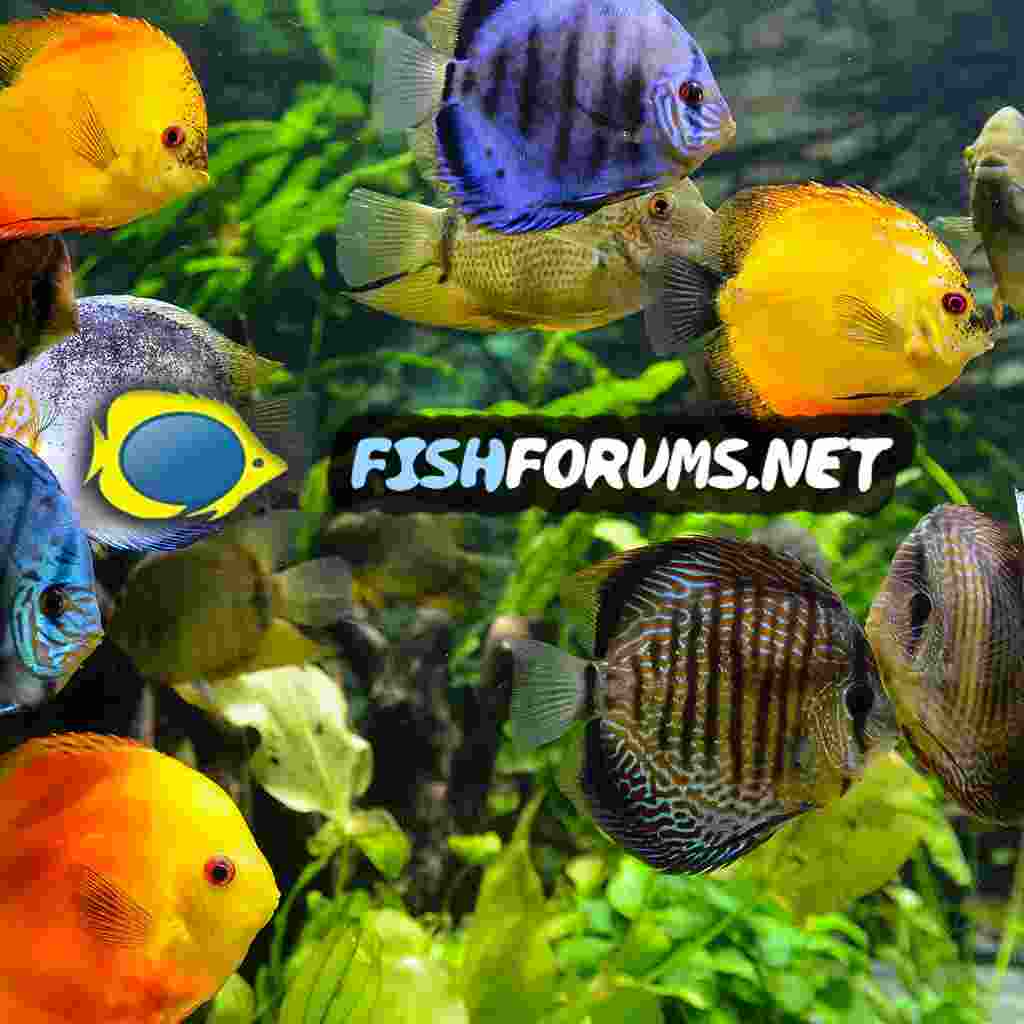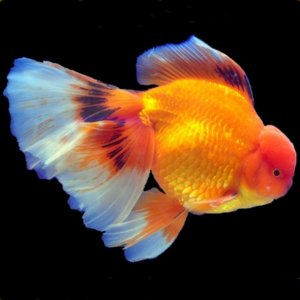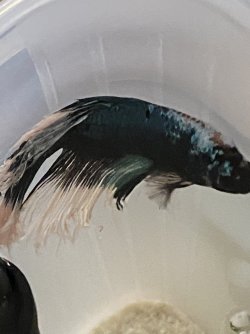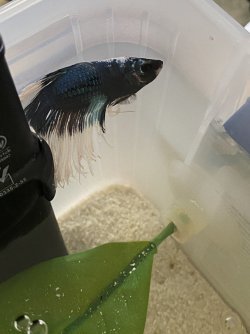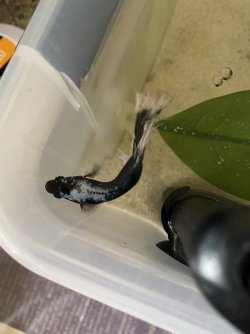This is a repost from other forums that have not responded to my plight. Please help!!
Neptune has been sick for going on two months now. I have tried multiple treatments, all which have failed. I was going through a rough patch, and the aquarium was neglected for a couple of months. I cleaned it up, and did a 50% water change two weeks in a row. I have currently been doing 10% water changes weekly. He is currently in a hospital tank with a heater and air pump.
Housing:
How many gallons is your tank? 10
Does it have a filter?yes
Does it have a heater? yes
What temperature is your tank? 79-79
Does your tank have an air stone or other type of aeration? no
Does your Betta have tank mates? What kind? yes 4 Corydoras, 1 pleco
Food:
What food brand do you use? fluval betta buffet, bug bites
Do you feed flakes or pellets? pellets
Freeze-dried? occasionally bloodworms
How often do you feed your Betta? How much? daily, 2-3 pellets per day. Before this started, I was giving 5-6 per day.
Maintenance:
Before your Betta became ill how often did you perform a water change? 1x per 2 weeks. There was a period where I was having a (personal) rough time that I did neglect the aquarium, and this is when he became noticeably ill. I did a 50% water change two weeks in a row, and have been doing 10% since weekly.
What percentage of water did you change? 25%
What is the source of your water? Tap
Do you vacuum the substrate or just dip out water? dipped out water, with complete cleaning every couple of months.
What additives do you use other than conditioner? What brand of conditioner? Prime water conditioner
Water Parameters:
What are your water parameters? Please give exact numbers. If tested by pet store please get exact numbers. "Fine" or "Safe" won't help us help you. Important: Test your water before the regular water change; not after one.
Ammonia: .25ppm
Nitrite: .25ppm
Nitrate: 10ppm
pH: 6.8-7
Hardness (GH): ?
Alkalinity (KH):?
Symptoms and Treatment:
When did you first notice the symptoms? approx 2 months ago
How has your Betta’s appearance changed? fins more ragged, red spots along spine, bloated (changes sides and possibly both at the same time), spine curved
How has your Betta’s behavior changed? more lethargic, lies on side at top of aquarium
Is your Betta still eating? yes
Have you started treating your Betta? If so, how? yes, Ran a course of Maracyn-2, API General cure, Epsom salt bath, aquarium salt, vitamins, fasting, peas. All the treatments were done in a hospital tank except for API General cure, which may be why my water parameters are currently out of whack.
Does your Betta have any history of being ill? no
How long have you owned your Betta? 7 months
Was he or she ill or suffering some sort of damage when purchased? no



1 - 1 of 1 Posts
Neptune has been sick for going on two months now. I have tried multiple treatments, all which have failed. I was going through a rough patch, and the aquarium was neglected for a couple of months. I cleaned it up, and did a 50% water change two weeks in a row. I have currently been doing 10% water changes weekly. He is currently in a hospital tank with a heater and air pump.
Housing:
How many gallons is your tank? 10
Does it have a filter?yes
Does it have a heater? yes
What temperature is your tank? 79-79
Does your tank have an air stone or other type of aeration? no
Does your Betta have tank mates? What kind? yes 4 Corydoras, 1 pleco
Food:
What food brand do you use? fluval betta buffet, bug bites
Do you feed flakes or pellets? pellets
Freeze-dried? occasionally bloodworms
How often do you feed your Betta? How much? daily, 2-3 pellets per day. Before this started, I was giving 5-6 per day.
Maintenance:
Before your Betta became ill how often did you perform a water change? 1x per 2 weeks. There was a period where I was having a (personal) rough time that I did neglect the aquarium, and this is when he became noticeably ill. I did a 50% water change two weeks in a row, and have been doing 10% since weekly.
What percentage of water did you change? 25%
What is the source of your water? Tap
Do you vacuum the substrate or just dip out water? dipped out water, with complete cleaning every couple of months.
What additives do you use other than conditioner? What brand of conditioner? Prime water conditioner
Water Parameters:
What are your water parameters? Please give exact numbers. If tested by pet store please get exact numbers. "Fine" or "Safe" won't help us help you. Important: Test your water before the regular water change; not after one.
Ammonia: .25ppm
Nitrite: .25ppm
Nitrate: 10ppm
pH: 6.8-7
Hardness (GH): ?
Alkalinity (KH):?
Symptoms and Treatment:
When did you first notice the symptoms? approx 2 months ago
How has your Betta’s appearance changed? fins more ragged, red spots along spine, bloated (changes sides and possibly both at the same time), spine curved
How has your Betta’s behavior changed? more lethargic, lies on side at top of aquarium
Is your Betta still eating? yes
Have you started treating your Betta? If so, how? yes, Ran a course of Maracyn-2, API General cure, Epsom salt bath, aquarium salt, vitamins, fasting, peas. All the treatments were done in a hospital tank except for API General cure, which may be why my water parameters are currently out of whack.
Does your Betta have any history of being ill? no
How long have you owned your Betta? 7 months
Was he or she ill or suffering some sort of damage when purchased? no



1 - 1 of 1 Posts



